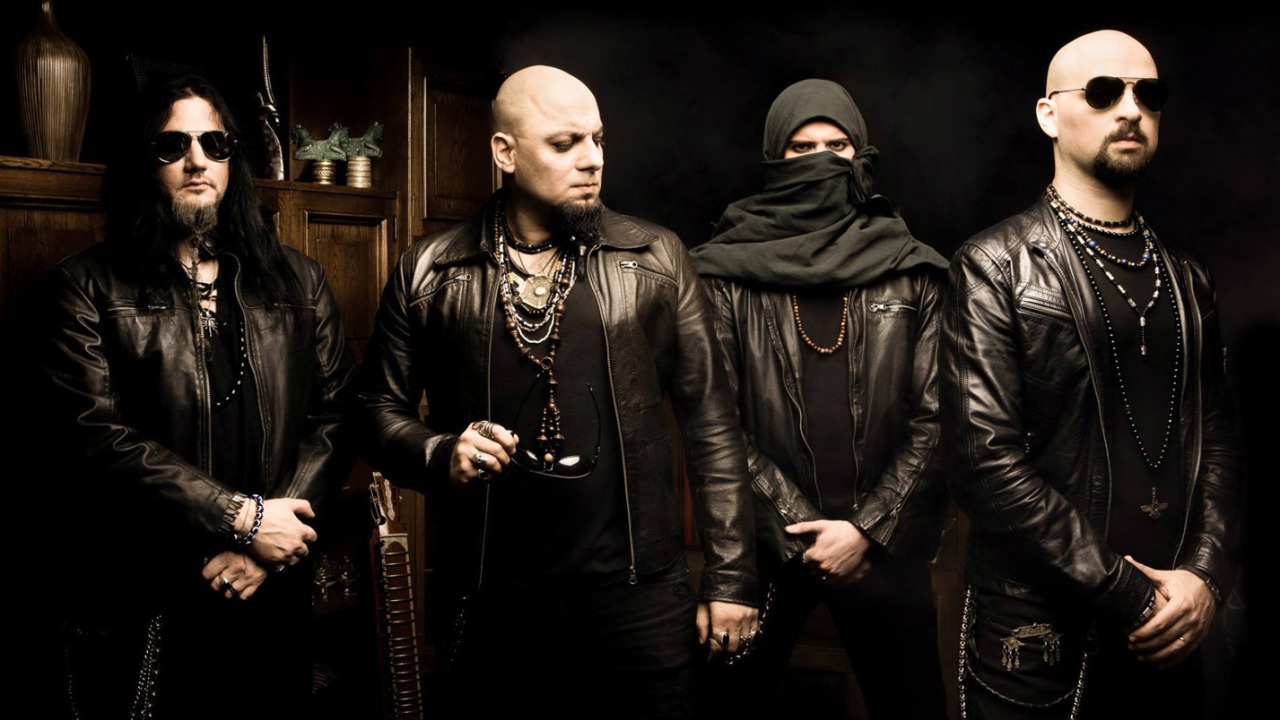It would be easy to write folk metal off as a bunch of Finnish blokes in kilts waving swords around and singing about Vikings and booze. The problem is, that’s a bit like pigeonholing thrash as Slayer and bands that sound exactly like Slayer. Actually, given the breadth of folk metal compared to thrash, it’s more like pigeonholing thrash as horrifying, lightspeed-fast songs about Nazi war criminals by Slayer. Sure, that might be a key landmark of the genre (and an awesome one at that) but it’s only a tiny fraction of the bigger picture.
Even if we narrow our definition of folk metal down to bands that incorporate not just folk themes but heavy use of folk instruments into their sound, the array of music we have at our eartips is vast. Hopping over the Gulf Of Finland from Helsinki to Talinn leads us to the vastly different (awesome) music of Metsatöll, whose music is less about drinking or glory and more about scary monsters living in the woods. Stride a little further south into Latvia, and you quickly encounter Skyforger, whose thrashy stylistic base is totally different again, and whose use of Baltic folk music is worked very differently into the overall sound.
Moving further afield, the differences become even more pronounced to the point any comparison with Korpiklaani become rather silly. There is nothing funtime, Finnish-sounding or tongue-in-cheek about the progressive metal of Orphaned Land (whose last album contained the catchiest chorus of 2013 with a 7⁄4 time signature). The Israelis are renowned throughout the Middle East for bringing their message of peace to a region ripped apart by conflict, hatred and mistrust, have won international recognition for their work (including a Metal Hammer Golden God), and are innovative in the way they mix prog metal with various Middle-Eastern and Jewish strains of music.
Continue east for a few thousand miles, and you find Chthonic mixing Taiwanese folk melodies with black metal. You also find the under recognised brilliance of Tengger Cavalry, who use Chinese and Mongolian folk music (including throat singing… more metal records need throat singing) with a galloping strain of melodeath, and are so productive, their latest album Ancient Call (which rules) was their sixth in four years.
This narrow definition of folk metal could continue to take us to new places for a long time, from the Irish music underpinning Cruachan (one of the very earliest folk metal bands) to the legendarily rubbish promo photos of Russia’s Arkona. But in truth, this is again only scratching the surface of the genre – going back to the thrash analogy, we’ve just about expanded beyond Slayer, but we’re still limiting ourselves to West Coast, USA thrash – only with folk metal, the proportion of the best bands we’re excluding is higher.
Folk metal is not just those bands that use folk instruments; bands that incorporate melodic and rhythmic techniques from folk music into purely (or largely) guitar-based bands are as much folk metal as Ensiferum, even if they might not initially appear so (and some of them may hit you for calling them that).
One of the longest-running, best examples is Primordial (sorry, Alan). The Irishmen use trad melodies and rhythms – lots of compound time signatures, giving them their trademark driving, slightly dancing feel – in a way that gives them a sound unique in metal. Well, apart from bands that rip them off, anyway. And there is nothing twee or light-hearted about Primordial, as titles like To The Nameless Dead, Gallows Hymn and Coffin Ships might reveal. This is a blackly serious, heavy fucking metal band who have more in common with Bathory than Battlelore.
Hopping back to Orphaned Land’s neck of the woods, to Jerusalem, brings us to Melechesh, a thrashy, melodic black metal band with riffs the size of pyramids – appropriate, considering their riffing style is routed in the music of the near East. And while you will occasionally (one song per album, usually) come across heavy use of folk instruments, it’s almost all played through distorted guitars, and they structure their songs like Metallica’s early works.
Having mentioned Bathory, it’s probably worth remembering that Quorthorn birthed one of the first strains of folk metal himself, the Hammerheart era of his work inspiring the Viking metal subgenre (the proper Viking metal subgenre, not the one people strangely keep trying to shoehorn Amon Amarth and Tursias into, however many times the bands themselves point out they don’t belong to). That subgenre straddles black metal and folk metal almost equally, with bands as varied as Borknagar, Enslaved (particularly on Eld), Ulver (the first two albums) and even Satyricon. Add in Mithotyn (members of whom later formed Falconer, a band that themselves mix folk with power and black metal – and could not sound more Swedish if they tried), Kampfar, Windir, Isengard (much as Fenriz might want us to forget about them), and the awesome Falkenbach, and you have a wide variety of black metal bands from Northern Europe who run from raw aggression through the epic up to very progressive and even post-metal stylings.
Confused yet? Because this is even before we include the Americana bands (Agalloch and old Slough Feg, for example), the Wacken-pleasing stuff only popular in Germany (Saltatio Mortis, for instance), and definitely not juggling the hot potato of the pure folk bands that have splintered off from metal and owe a fair amount to it atmospherically – Wardruna, for instance, or the wonderful Man’s Gin project by Cobalt’s Eric Wunder.
The point is, writing folk metal off as some silly little gimmick for getting drunk to and dancing at Bloodstock isn’t just wrong because Finntroll are brilliant, it’s wrong because the bands that fit that stereotype are a tiny, unrepresentative fraction of what the genre can do.
Read our Bluffer’s Guide To Folk Metal.
